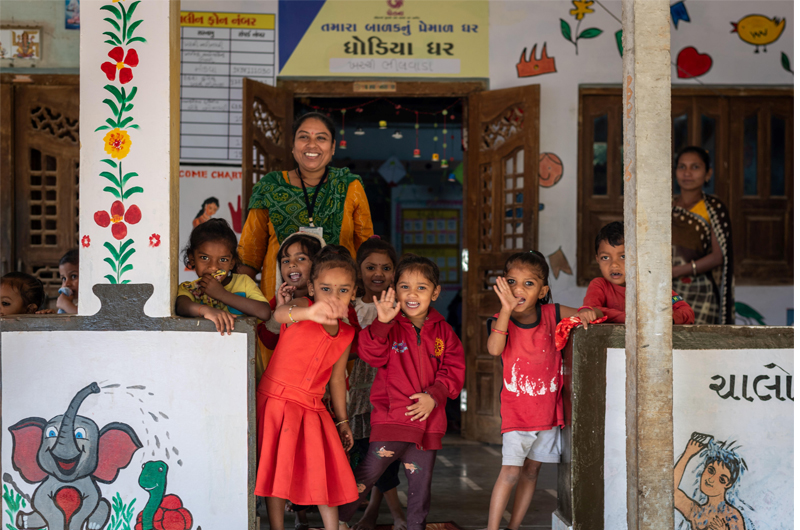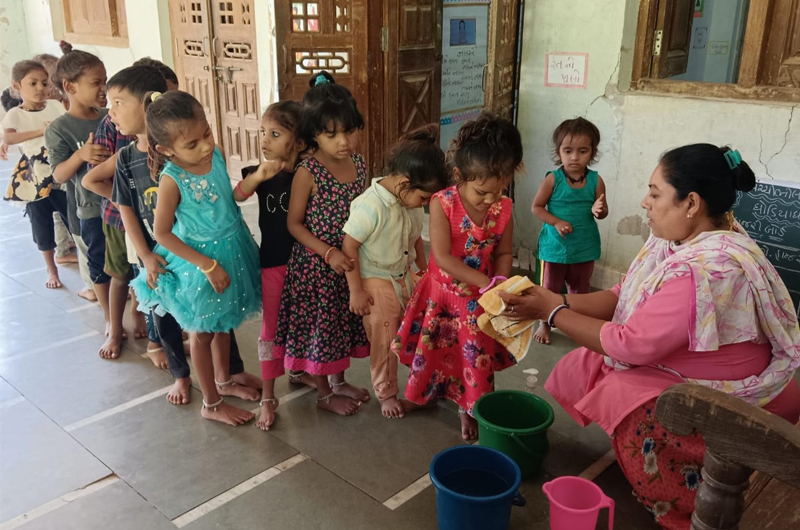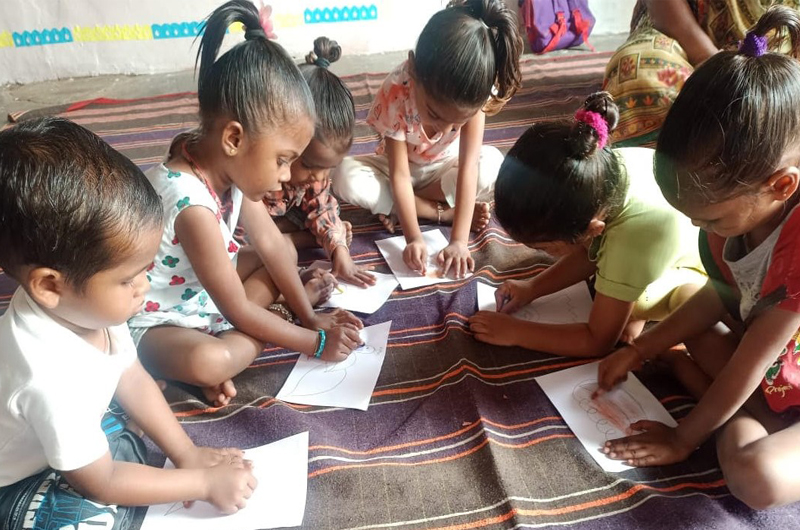CHETNA (Centre for Health Education Training and Nutrition Awareness) based in Ahmedabad is one of India’s pioneering as well as leading NGOs working on women and girl’s empowerment, health and nutrition issues. On turning 40 last August, it showed to the world through a coffee table book, CHETNA@40 – Nurturing Dreams, Empowering Destinies, its struggles and achievements and the ongoing impact of its work. CHETNA was set up by three young women fresh out of college, two as nutritionists and one eager to work as a child educator – Indu Capoor, Pallavi Patel and Minaxi Shukla – and was an endeavour of the Nehru Foundation for Development. For the three women, it was ground-breaking work from the grassroots. Usha Rai narrates three of the stories featured in the book that won CHETNA kudos. Here is the second story
While traditionally the focus has been on improving the child sex ratio, maternal health and combating anaemia, in 2023 CHETNA took on an additional responsibility – improving the earning capacity of young mothers by providing day care centre (DCC) facilities for their young ones. Women working in agricultural fields or doing daily wage labour work can now go out and get employment in factories and business units coming up in smaller cities and industrial hubs and dream big.
For the past 18 months, ten DCCs, open from 8 am to 5 pm in Jhagadia Block of Bharuch District, Gujarat, are not only enabling women to look for jobs with better income but are ensuring their children have a safe environment where their health, nutrition and early learning capacities are developed. The DCCs are a private sector initiative but are working in tandem with the government’s anganwadi (nursery) centres in eight villages of Jhagadia Block. From just a handful of children aged three to six years in July 2023 when the first DDC was opened, their number has risen to 159 children.
Tarnistha Ray, programme coordinator, CHETNA, said: “Initiating day care centres at the village level presented several challenges in the beginning. We conducted numerous community meetings to explain the concept of DCC, resulting in some parents registering their children’s names at each Centre. However, there remained a lingering sense of mistrust initially, leading mothers and grandmothers to frequently visit the centres till they gained confidence. Over time, regular interactions during monthly parent meetings proved instrumental in building trust. It’s gratifying that local educated women stepped forward to take charge of the DCCs and as helpers. Mothers are now content with the increased income opportunities and are pleased that their children are well cared for at the DCCs.”
Making it work
Each DCC has been strategically opened about 500 metres from an anganwadi and caters to about 15 to 16 children. It is run by a crèche worker and a helper, both trained and from the same village in which the anganwadi is located, thus giving greater confidence to the parents. The parents drop the children at the DCC at 8 or 9 am before setting out to work. At lunch time, the children between the ages of three and six years are walked to the anganwadi whereas the younger ones stay at the DCC.

It is run by a crèche worker and a helper, both trained and from the same village in which the anganwadi is located, thus giving greater
confidence to the parents.
The children at the anganwadi get a hot meal. In addition, they get a snack when they come to the DCC in the morning and another in the evening before leaving for home. The younger children receive lunch and snacks twice a day at the DCC. They also have an hour’s nap post lunch. The rest of the time goes in developing their cognitive and creative skills like drawing and language development. Each child’s nutritional status is prominently displayed in charts in red (severely underweight), yellow (moderately underweight) or green (child with normal weight as per age). There is a close follow-up till they reach the green category of normal nutritional status.
Impact
Dadheda Village, which has a large population of migrant workers from Uttar Pradesh, Bihar and West Bengal, has two DCCs and caters to about 50 children. The language of communication is Hindi. A range of chemical, plastic and glass industries have come up around Dadheda, giving an opportunity for young mothers to earn more than they would as agriculture labourers and domestic workers. With their children secure and cared for in the DCC, even domestic workers are working in two to three houses and bringing home bigger pay packets. The agriculture labour rates in Gujarat are Rs 350 to Rs 400 a day. Those working in factories, industrial units and even in petty shops earn Rs 10,000 to Rs 15,000 and some even Rs 20,000 a month. Even women who don’t have full time jobs are enjoying the time for themselves till it is time to pick up their young ones.
How safety spurred confidence
Anitaben, 25, a daily wage worker of Gumanpura Village was taking her son Divyesh, not even two years, to work with her since there was no one at home to look after him. Then she heard of the DCC and sought his admission. The DCC as well as Anitaben, however, were initially hesitant to admit such a young child. It was also against the DCC’s protocol and a decision had to be taken at the highest level.

before leaving for home. The younger children receive lunch and snacks twice a day at the DCC. Here, children line up for snacks.
Anitaben spent two days with Divyesh at the centre. Then she left him alone at the centre till 2.30 pm for a couple of days. As her child made friends and grew comfortable, Anitaben was confident that she had made the right decision. She now leaves him at 8. 30 am and picks him up at 5 pm. For the first three months she was not charged any money, then she began paying Rs 100 a month. Since she earns Rs 300 a day, it was a good deal and her child was safe and cared for.
For Sahiyaben, too, putting her five-year-old daughter Jannat at Dadheda Village DCC has enabled her to focus on her work as a seamstress for longer hours and her monthly earning has doubled to about Rs 3000. Sahiyaben makes it a point to attend the monthly parents/teacher meeting of the DCC and scores well on the development graph.
(The writer is a veteran journalist who brought in social issues including women’s issues, environment, education, health and rural development into mainstream media. For four decades, she worked for The Times of India, Indian Express and Hindustan Times, from Delhi, and for a while also worked for the Press Institute of India. She has been associated with CHETNA for many years now.)



 from Webdoux
from Webdoux